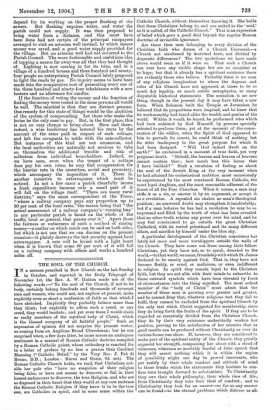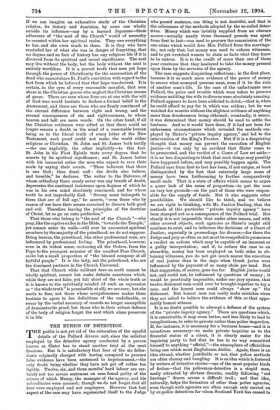I N a sermon preached in Bow Church on the last
Sunday in October, and reported in the Daily Telegraph of November 1st, the Rev. A. W. Hutton made use of the following words :—" To the soul of the Church, if not to its body, certainly belong hundreds and thousands of reverent men and women, who could not, not anyhow at present, make explicitly even so short a confession of faith as that which I have sketched. Implicitly they probably believe more than they think; but explicitly to affirm such a creed, or any creed, they would hesitate ; and yet even these I would claim as really members of the mystical body of Christ, which is the blessed company of all faithful people." Such an expression of opinion did not surprise the present writer, as coming from an Anglican Broad Churchman ; but he was surprised when, a few days later, he came across an analogous sentiment in a manual of Roman Catholic doctrine compiled by a Roman Catholic priest, whose orthodoxy is vouched for in a letter of preface by no less a person than Cardinal Manning (" Catholic Belief," by the Very Rev. J. Fait di Bruno, D.D. ; London : Burns and Oates, 6d. net). The Roman Catholic Church holds, we read, that Christians out- side her pale who " have no suspicion of their religion being false, or have not means to discover, or fail in their honest endeavours to discover, the true Religion, and who are so disposed in their heart that they would at any cost embrace the Roman Catholic Religion if they knew it to be the true one, are Catholics in spirit, and in some sense within the Catholic Church, without themselves knowing it. She holds that these Christians belong to, and are united to the soul,' as it is called, of the Catholic Church." That is an expression of belief which goes a good deal beyond the regular Roman doctrine of invincible ignorance.
Are there then men belonging to every division of the Christian faith who dream of a Church Universal,—a Church not straitened by doctrinal tests, not divided by dogmatic differences ? The two quotations we have made above would seem as if it were so. That such a Church can ever have any visible shape few are so sanguine as to hope; but that it already has a spiritual existence there are evidently those who believe. Probably there is no man of any religious imagination to whom the dogmas and rules of his Church have not appeared at times to be so much dry legality, so much subtle metaphysics, so many disputable historical statements. The sensation is no new thing, though in the present day it may have taken a new form. When Solomon built the Temple at Jerusalem he believed that its proportions were inspired, and he knew that its workmanship had taxed alike the wealth and genius of the world. Within it would, he hoped, be performed rites which had been ordained by God Himself, by persons specially selected to perform them ; yet at the moment of the conse- cration of the edifice, when the Spirit of God appeared to him to pervade its courts, he could think of nothing but its utter inadequacy to the great purpose for which it had been designed. " Will God indeed dwell on the earth ? " he exclaimed in a moment of true faith, yet very poignant doubt. " Behold, the heaven and heaven of heavens cannot contain thee ; how much less this house that I have builded ? " Such a revulsion of feeling as shook the soul of the Jewish King at the very moment when he had attained his ecclesiastical ambition must occasionally be experienced by the most convinced Roman Catholic, the most loyal Anglican, and the most reasonable adherent of the freest of all the Free Churches. When it comes, a man may stifle it as a sin, or answer it by an argument, or accept it as a revelation. A repented sin shakes no man's theological position ; an answered doubt may strengthen it incalculably; but if a man believes he has had a revelation he may be so impressed and filled by the truth of what has been revealed that no other truth retains any power over his mind, and he may feel constrained to go outside the great Christian Cathedral, with its varied priesthood and its many different altars, and sacrifice by himself under the blue sky.
A particular development of the Christian conscience has lately led more and more worshippers outside the walls of the Church. They have come out from among their fellow- Christians, yet they have not, so to speak, deserted to the world,—to that world, we mean, friendship with which St. James declared to be enmity against God. That is, they have not become fleshly, or cruel, or malicious, or even indifferent to religion. In spirit they remain loyal to the Christian faith, but they are not able with their minds to subscribe to those outward symbols which have been elevated by force of circumstances into the thing signified. The most ardent member of the " body of Christ" must admit that the number of these men is growing ever greater and greater, and he cannot deny that, whatever religious test they fail to fulfil, they cannot be excluded from the spiritual Church by the only test which Christ suggested for membership, since they do bring forth the fruits of the spirit. If they are to be regarded as essentially divided from the Christian Church, they do by their very existence undoubtedly weaken her position, proving to the satisfaction of her enemies that as good results can be produced without Christianity as ever its various forms can show. If, however, they are considered to make part of the spiritual entity of the Church, they greatly augment her strength, compassing her about with a cloud of witnesses, witnesses so morbidly fearful of false speech that they will assert nothing which it is within the region of possibility might one day be proved inaccurate, who yet testify by their whole conduct and attitude of mind to those truths which the statements they hesitate to con- firm were brought forward to substantiate. To Christianity they owe their whole philosophy, their whole view of life ; from Christianity they take their ideal of conduct ; and to Christianity they look for an answer—so far as any answer can be found—to the eternal problems which distress us all. If we can imagine an exhaustive study of the Christian religion, its history and dominion, by some one wholly outside its influence—say by a learned Japanese—these adherents of "the 'soul of the Church" would of necessity be counted within her spiritual realm. They owe everything' to her, and she owes much to them. It is they who have reminded her of what she was in danger of forgetting, that nd dogma and no fact of history has any religious life if it is divorced from its spiritual and moral significance. The soul may live 'without the body, but the body without the soul is entirely worthless. It is a proved truth that men yet hope through the power of Christianity for the resurrection of the dead who cannot share St. Paul's conviction with regard to the fact from which he believed that that hope was derived. It is certain, in the eyes of every reasonable moralist, that men share in the Christian graces who neglect the Christian means Of grace.' There are men whose lives are at one with the will df God wno would hesitate to declare a formal belief in the Atonement, and there are those who are firmly convinced of the eternal difference between right and wrong, and the eternal consequences of sin and righteousness, to whom heaven and hell are mere words. On the other hand, if all the Christian evidences were sifted so that there could no longer remain a doubt in the mind of a reasonable human being as to the literal truth of every letter of the New Testament, such proof could not make the world either religious or Christian. St. John and St. James both testify —the one explicitly, the other implicitly—to this fact. St. John in his First Epistle tests every dogma that he asserts by its spiritual significance ; and St. James lashes with his immortal satire the men who expect to save their souls by- saying their creeds. " Thou believest that there is one God ; thou doest well : the devils also believe, and tremble," he declares. The writer to the Hebrews, of whose orthodoxy there surely never was any breath of doubt, deprecates the continual insistence upon dogmas of which he was in his own mind absolutely convinced, and for whose truth he not improbably died. " Strong meat belongeth to them that are of full age," he asserts, " even those who by reason of use have their senses exercised to discern both good and evil. Therefore leaving the principles of the doctrine of Christ, let us go on unto perfection."
That those who belong to "the soul of the Church "—who pray, like the captive exiles in the Bible, "towards the Temple," yet cannot enter its walls—will ever be accounted spiritual members by the majority of the priesthood, we do not suppose: Being human, the priesthood, like other professional men, are influenced by professional feeling. The priesthood, however, even in its widest sense, reckoning all the Orders, from the Pope to the youngest minister of the smallest Free Church, make but a small proportion of "the- blessed company of all faithful people." It is the laity, not the priesthood, who are the dominant partners in the Church 'Universal That that Church while militant here on earth cannot be 'wholly spiritual, cannot but make definite assertions which, while they are not false, yet fall short of the whole truth as it is known to the spiritually minded (if such an expression as " the whole truth" is permissible at all), we are sure; but she needs to fear, not those whose scrupulousness makes them -hesitate to agree in her definitions of the undefinable, or swear by the verbal accuracy of records no longer susceptible of demonstrable proof, but those who in their robust defence Of the body of religion forget the soul which alone preserves it in life.
THE ETHICS OF DETECTION.











































 Previous page
Previous page